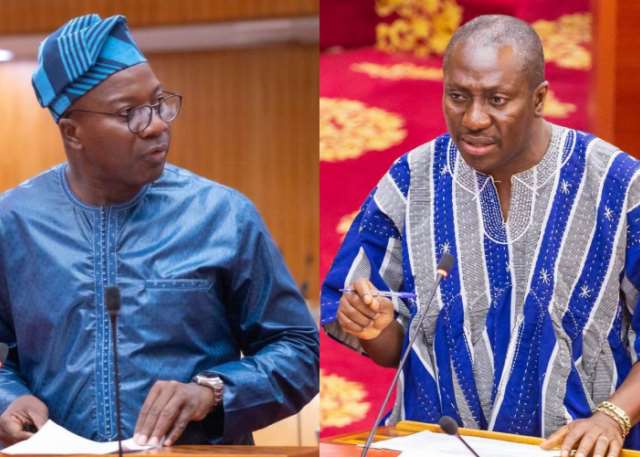The Ghanaian Parliament embarked on a critical process of vetting seven nominees to the Supreme Court, an event that ignited a fiery debate over judicial independence and political influence. Minority Leader Alexander Afenyo-Markin set the tone with a sharp critique of the Mahama administration, accusing the government of hypocrisy for nominating seven justices simultaneously after previously opposing similar appointments by the Akufo-Addo government. Afenyo-Markin’s central argument revolved around the perceived politicization of the judiciary, arguing that the court’s recent silence on crucial matters reflected a dangerous trend of acquiescence to political pressure. He challenged the vetting committee to prioritize integrity and judicial independence above partisan considerations, emphasizing that the court’s authority rests on moral principles, not political affiliations. He questioned the sincerity of the NDC’s concerns about the size of the court, given their current actions, and urged a rigorous vetting process to ensure only individuals with unwavering commitment to judicial independence were appointed.
Majority Leader Mahama Ayariga responded by staunchly defending the nominations, asserting their constitutional validity and refuting allegations of double standards. Ayariga clarified that the NDC’s previous opposition to Supreme Court appointments under President Akufo-Addo stemmed from concerns about the timing of the appointments relative to the elections, not from political maneuvering. He argued that the current nominations were being made within the appropriate constitutional timeframe and therefore did not violate any principles. Ayariga urged the committee to focus on the nominees’ qualifications and competence rather than engaging in partisan attacks, emphasizing the need for a fair and objective assessment of each candidate’s suitability for the highest court of the land. The clash between the two leaders highlighted the tension between political expediency and the imperative of preserving the judiciary’s independence.
The seven nominees presented to Parliament for consideration represented a diverse range of legal expertise and experience. Justice Senyo Dzamefe brought to the table his chairmanship of the 2014 FIFA World Cup Commission of Inquiry, demonstrating experience in handling complex investigations. Justice Sir Dennis Dominic Adjei’s expertise in human rights law offered a potential strengthening of the court’s capacity in this crucial area. Justice Gbiel Simon Suurbaareh was recognized for his distinguished service in the Upper West Region, suggesting a familiarity with the challenges and realities facing different parts of the country. Justice Philip Bright Mensah’s expertise in electoral and civil appeal jurisprudence was particularly relevant given the court’s role in adjudicating election-related disputes.
Justice Janapare Adzua Bartels-Kodwo’s contributions to appellate law reform signaled a potential to contribute to the ongoing development of Ghana’s legal system. Justice Hafisata Amaleboba’s advocacy for criminal justice reform suggested a commitment to improving the fairness and effectiveness of the criminal justice system. Finally, Justice Kweku Tawiah Ackaah-Boafo’s reputation for landmark commercial and constitutional rulings indicated a depth of experience in interpreting complex legal issues. The diversity of backgrounds and expertise among the nominees offered the potential for a more representative and well-rounded Supreme Court, capable of addressing the complex legal challenges facing Ghana.
The parliamentary vetting process held immense significance for the future of the Ghanaian judiciary. The selection of Supreme Court justices is a crucial element in upholding the rule of law and ensuring the independence of the judicial branch. The intense scrutiny applied to the nominations underscored the importance of maintaining public trust in the integrity of the court. The debate surrounding the nominations also reflected broader concerns about the relationship between the executive and judicial branches of government, highlighting the need for clear boundaries and mechanisms to protect judicial independence from political interference.
The outcome of the vetting process would have far-reaching implications for the administration of justice in Ghana. The new justices, if confirmed, would play a crucial role in shaping the legal landscape and interpreting the constitution for years to come. Their decisions would impact a wide range of issues, from fundamental human rights to commercial disputes and constitutional matters. Therefore, the selection process was not merely a political exercise but a crucial step in safeguarding the principles of justice and ensuring the effective functioning of Ghana’s democracy. The careful consideration of each nominee’s qualifications, integrity, and commitment to judicial independence was essential to maintaining the integrity and credibility of the Supreme Court.
Ultimately, the parliamentary vetting of the Supreme Court nominees served as a critical test of Ghana’s democratic institutions. The process highlighted the importance of transparency and accountability in the appointment of judges, and the need for a robust system of checks and balances to safeguard the independence of the judiciary. The outcome of the vetting process would not only determine the composition of the Supreme Court but also send a powerful message about the nation’s commitment to upholding the rule of law and ensuring equal access to justice for all citizens. The scrutiny applied to the nominees and the vigorous debate surrounding their appointments underscored the vital role of the judiciary in a democratic society and the ongoing need to protect its independence from political influence.


